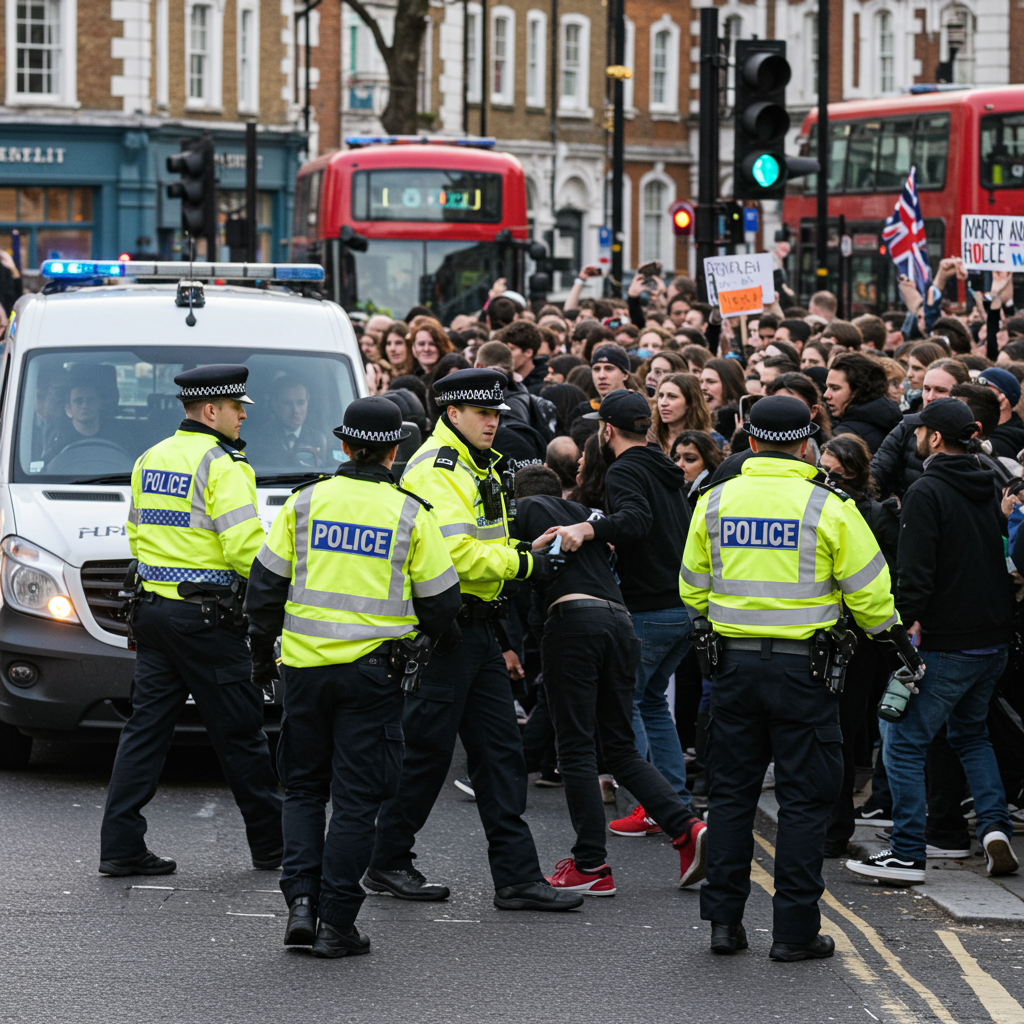London witnessed an unprecedented display of state power as UK police made hundreds of arrests at a protest supporting Palestine Action, a group recently banned under anti-terrorism legislation. The controversial crackdown has ignited a fierce debate over fundamental freedoms and the scope of protest rights in the United Kingdom. This extensive operation by the Metropolitan Police has drawn significant criticism from human rights organizations and experts, raising urgent questions about civil liberties and the future of dissent in the country.
The Unprecedented Crackdown in London
On a recent Saturday in Parliament Square, the heart of London, Metropolitan Police officers detained an astounding number of individuals, reportedly 466 specifically for supporting a proscribed organization. This figure represents one of the largest single-day mass arrests in the UK in the last decade, escalating concerns over the government’s approach to protest. Beyond those arrested for supporting Palestine Action, additional detentions included individuals for assaulting officers and other public order offenses, bringing the total tally of arrests on that day to 474 according to some reports, or even 522 according to later police figures, underscoring the sheer scale of the operation.
The protest, primarily organized by Defend Our Juries, saw hundreds gather to voice their opposition to the British government’s decision to ban Palestine Action. Many demonstrators, some bearing black and white Palestinian scarves, held placards declaring, “I oppose genocide. I support Palestine Action.” Videos from the scene captured police officers physically carrying away protesters, while onlookers chanted “shame on you” at the authorities. The sheer volume of arrests strained police resources, with temporary processing points established nearby to manage the influx of detainees, some of whom were later released on bail with strict conditions prohibiting further participation in Palestine Action-related protests. Notably, individuals ranging from teenagers to an 89-year-old woman were among those taken into custody.
The Proscription of Palestine Action: Why and How
The roots of this mass arrest lie in the UK government’s proscription of Palestine Action in July under the Terrorism Act 2000. This controversial legal designation effectively criminalizes membership in or support for the group, carrying a severe maximum sentence of 14 years in prison. The ban followed a series of direct action protests, most prominently an incident in June where Palestine Action members allegedly broke into the Royal Air Force’s largest station, RAF Brize Norton. During this event, activists reportedly caused millions of pounds in damages, specifically targeting military aircraft with red paint, claiming responsibility as a protest against the UK’s perceived complicity in the Gaza conflict.
Government’s Stance and Justification
Home Secretary Yvette Cooper has vehemently defended the ban, asserting that it was enacted based on “strong security advice” and an assessment that Palestine Action “prepares for terrorism.” Cooper emphasized that “UK national security and public safety must always be our top priority,” distinguishing Palestine Action’s activities from legitimate protest rights, which she claimed the government fiercely protects. She unequivocally stated that Palestine Action “is not a non-violent organisation,” citing previous incidents involving “violence, significant injuries and extensive criminal damage.” Shadow Home Secretary Chris Philp echoed this sentiment, suggesting that protesters supporting the proscribed group “should feel the full force of the law.”
Palestine Action, for its part, contends that its actions are a response to what it describes as the British government’s complicity in alleged Israeli war crimes in Gaza. The group has a history of targeting Israel-linked companies and military suppliers in the UK through various forms of civil disobedience, including spraying red paint and disrupting operations.
A Legal and Human Rights Battle
The government’s decision to ban Palestine Action and the subsequent mass arrests have sparked widespread condemnation from various human rights organizations and international experts. Amnesty International UK expressed “deep concern,” with its chief executive, Sacha Deshmukh, calling the arrests “disproportionate to the point of absurdity.” He criticized the UK’s terrorism law as “excessively broad and vaguely worded,” arguing that these arrests highlight its potential threat to freedom of expression. Similarly, United Nations human rights experts have voiced alarm, stating that labeling Palestine Action as a “terrorist” group is “unjustified,” given that the group’s actions have largely been limited to property damage without endangering life.
Greenpeace UK and Labour MP John McDonnell have also joined the chorus of criticism, with Greenpeace co-executive director Areeba Hamid accusing the Metropolitan Police of becoming “thought police.” Protesters themselves articulated their profound worries about the erosion of civil liberties. One anonymous individual shared fears of further bans, questioning, “If they ban Palestine Action, what other group is next? Until we’re just no longer allowed to protest anything. That’s the opposite of democracy.”
Voices from the Frontline and Expert Analysis
Despite the looming threat of arrest and severe penalties, protesters like Claudia Penna-Rojas stated their refusal to be bystanders, highlighting their deep concern for the situation in Palestine. Jacob Ecclestone, an 86-year-old participant, condemned the government’s actions as “deeply authoritarian” and “extremely dangerous,” emphasizing his unwavering belief in freedom of speech.
Security expert Lizzie Dearden offered a critical perspective, noting that the Terrorism Act, originally drafted for groups like the IRA and al-Qaeda, is now being applied in a “completely new way” to an organization like Palestine Action. This shift in application raises significant legal and ethical questions about the evolving definition of “terrorism” and its implications for protest movements.
Broader Implications for UK Civil Liberties
The mass arrests at the Palestine Action protest represent a critical juncture for civil liberties in the UK. The proscription of a group that primarily engages in civil disobedience, even if it involves property damage, under anti-terrorism laws sets a concerning precedent. This move could empower the government to broaden the scope of what constitutes “terrorism,” potentially stifling future protests on a wide range of issues. The argument from critics is that distinguishing legitimate protest from criminal activity is paramount, and classifying groups as “terrorist” based on property damage alone overreaches the intent of such legislation.
The impact of this ruling extends beyond immediate arrests. It creates an atmosphere where individuals might self-censor or hesitate to participate in demonstrations, fearing severe legal repercussions. This chilling effect could fundamentally alter the landscape of democratic expression in the UK, limiting the public’s ability to challenge government policies or express solidarity with international causes without fear of proscription.
Ongoing Legal Challenges and Future Outlook
The ban on Palestine Action is far from settled, facing significant legal challenges. In a notable development, Huda Ammori, a co-founder of Palestine Action, last week won a bid to bring a judicial review against the ban. Her lawyers argue that the proscription disproportionately interferes with the right to freedom of expression, a case expected to proceed to a full review later in 2025. This legal battle underscores the deep division over the interpretation of protest rights versus national security concerns.
Prior to the massive London protest, over 200 individuals had already been detained nationwide for demonstrating against the ban. Furthermore, the first three individuals in England and Wales have already been charged for supporting Palestine Action since the ban took effect on July 5. The ongoing arrests and legal challenges signify a protracted struggle that will continue to test the boundaries of free speech and assembly in the UK.
Frequently Asked Questions
What is Palestine Action and why was it recently banned in the UK?
Palestine Action is a direct action protest group that targets companies and organizations in the UK perceived to be complicit in what it terms Israeli war crimes in Gaza. The UK government proscribed Palestine Action under the Terrorism Act 2000 in July. This ban was enacted following a series of protests, including an incident at RAF Brize Norton where members allegedly caused millions of pounds in damage to military aircraft by spraying them with red paint. The government asserts the ban is based on “strong security advice,” classifying the group as “not non-violent” and citing “serious attacks” and “extensive criminal damage.”
Where did the recent mass arrests occur and who organized the protest?
The recent mass arrests, numbering over 466 individuals, primarily occurred in Parliament Square in central London. This protest was notably organized by “Defend Our Juries,” a group that champions the right to protest and open justice. Demonstrators gathered to express their opposition to the UK government’s ban on Palestine Action, holding placards and chanting slogans. The choice of Parliament Square, directly adjacent to the Houses of Parliament, was symbolic, aiming to bring their message directly to the seat of power.
What are the legal implications for individuals showing support for Palestine Action?
Following the proscription of Palestine Action under the Terrorism Act 2000, showing support for the group or being a member has become a criminal offense. This can carry a maximum sentence of 14 years in prison. Individuals arrested at the recent London protest were primarily detained for “showing support for a proscribed organization.” Many were bailed with conditions preventing them from attending further Palestine Action-related demonstrations. The ban is currently facing a legal challenge through a judicial review initiated by Palestine Action’s co-founder, Huda Ammori, arguing it infringes on freedom of expression.
The extraordinary events in London highlight a deepening divide over the boundaries of protest and state control in the UK. As legal challenges unfold and public debate intensifies, the implications of these mass arrests for fundamental freedoms in a democratic society will continue to be a focal point of concern and scrutiny.




